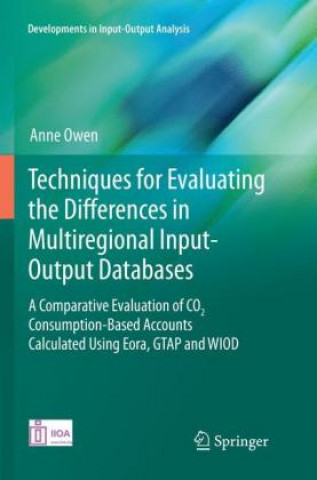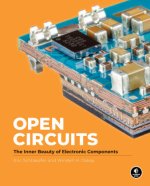
Kód: 20093765
Techniques for Evaluating the Differences in Multiregional Input-Output Databases
Autor Anne Owen
This book introduces the Eora, Global Trade Analysis Project (GTAP) and World Input-Output (WIOD) databases and provides detailed metadata on the data sources, database structures and construction techniques used to build each sys ... celý popis
- Jazyk:
 Angličtina
Angličtina - Väzba: Brožovaná
- Počet strán: 217
Nakladateľ: Springer International Publishing AG, 2018
- Viac informácií o knihe

Mohlo by sa vám tiež páčiť
-

Content Marketing
12.68 € -

Montaigne
31.15 € -

Russian Idea-Jewish Presence
46.88 € -

Gace Program Admission Assessment 200, 201, 202, 700
48.60 € -3 % -

Blue Line to Wonderland
45.76 € -

Predicting Storms
36.02 € -

MILICIANA
15.52 € -6 %
Darujte túto knihu ešte dnes
- Objednajte knihu a vyberte Zaslať ako darček.
- Obratom obdržíte darovací poukaz na knihu, ktorý môžete ihneď odovzdať obdarovanému.
- Knihu zašleme na adresu obdarovaného, o nič sa nestaráte.
Viac informácií o knihe Techniques for Evaluating the Differences in Multiregional Input-Output Databases
Nákupom získate 360 bodov
 Anotácia knihy
Anotácia knihy
This book introduces the Eora, Global Trade Analysis Project (GTAP) and World Input-Output (WIOD) databases and provides detailed metadata on the data sources, database structures and construction techniques used to build each system. It offers a detailed account of how multi-regional input-output (MRIO) databases are used to calculate consumption-based accounts - guiding the reader through each mathematical step and explaining the associated equations. It demonstrates that different MRIO databases calculate different national level consumption-based CO2 accounts. If these results are to be used as evidence in climate policy-making, analysts need to be confident about the accuracy of the databases and understand why the results differ. It carefully explains the mathematical equations behind each technique and provides a link to a repository where the reader can access specially prepared MATLAB functions associated with the techniques. To make meaningful comparisons between the three MRIO databases, each is mapped to a consistent classification system comprising 40 countries and 17 sectors. Further, readers can access the aggregated databases using the link provided. The effect of this aggregation is shown to be minimal, so readers can be confident that the aggregated versions of each database reflect the full-sized versions. The book concludes by making recommendations as to how future MRIO databases could be accurately and consistently constructed and how they should be used in policy-making in light of the findings. Endorsement Anne Owen did a splendid job in comparing the most important Global Multiregional Input Output databases (GMRIO) available. She probably is the first to develop a good understanding what factors in GMRIO construction really contribute to uncertainties in carbon footprint analysis. A great achievement, packed in easy to understand language! Prof. Arnold Tukker Scientific director CML Leiden, NL With its thorough investigations and clear explanations of the differences in MRIO databases and outcomes, this book is compulsory reading for both skilled practitioners and scholars when starting any input-output analysis in a multiregional context. Dr. Harry C. Wilting Senior researcher, environment and economics PBL Netherlands Environmental Assessment Agency, NL A novel exposition on understanding some of the biggest datasets underpinning current global sustainability assessments. Dr. Owen straddles technical incision with practitioner relevant insights and includes a range of methodological advances that will ensure the continued relevance of this work for many years to come. Prof. Richard Wood Industrial Ecology Program NTNU, Norway
 Parametre knihy
Parametre knihy
144.50 €
- Celý názov: Techniques for Evaluating the Differences in Multiregional Input-Output Databases
- Podnázov: A Comparative Evaluation of CO2 Consumption-Based Accounts Calculated Using Eora, GTAP and WIOD
- Autor: Anne Owen
- Jazyk:
 Angličtina
Angličtina - Väzba: Brožovaná
- Počet strán: 217
- EAN: 9783319846828
- ID: 20093765
- Nakladateľ: Springer International Publishing AG
- Hmotnosť: 421 g
- Rozmery: 11 × 155 × 15 mm
- Dátum vydania: 04. May 2018
Obľúbené z iného súdka
-

Dune
12.98 € -

Haunting Adeline
30.64 € -

Berserk Deluxe Volume 2
52.15 € -

White Nights
3.54 € -24 % -

Powerless
12.47 € -3 % -

Atomic Habits
17.04 € -24 % -

Dune Messiah
9.02 € -19 % -

Berserk Deluxe Volume 3
47.79 € -5 % -

One Day
11.05 € -23 % -

Berserk Deluxe Volume 1
44.54 € -12 % -

Iron Flame
16.33 € -24 % -

Surrounded by Idiots
10.04 € -16 % -

Harry Potter and the Prisoner of Azkaban (Minalima Edition)
27.59 € -32 % -

Gravity Falls Journal 3
21.91 € -

Heaven Official's Blessing: Tian Guan Ci Fu (Novel) Vol. 1
21.81 € -

The Creative Act
24.04 € -12 % -

Dune
9.73 € -24 % -

Hunting Adeline
31.75 € -

A Little Life
17.55 € -

Children of Dune
9.53 € -15 % -

Heaven Official's Blessing: Tian Guan Ci Fu (Novel) Vol. 2
20.39 € -3 % -

Bungo Stray Dogs, Vol. 8 (light novel)
16.02 € -

Percy Jackson and the Olympians 5 Book Paperback Boxed Set
47.38 € -

Solo Leveling, Vol. 1
21.71 € -

The Prisoner's Throne
10.65 € -21 % -

Court of Thorns and Roses
9.43 € -21 % -

Cry Baby Coloring Book
10.75 € -4 % -

Fourth Wing
14.91 € -24 % -

Icebreaker
9.43 € -15 % -

Berserk Deluxe Volume 6
47.79 € -5 % -

Avatar, the Last Airbender: The Kyoshi Novels (Box Set)
27.29 € -33 % -

The 48 Laws of Power
26.17 € -3 % -

House of Leaves
23.23 € -22 % -

Twisted Lies
9.73 € -18 % -

Dune Messiah
12.57 € -12 % -

No Longer Human
16.84 € -

48 Laws Of Power
22.42 € -5 % -

Twisted Games
9.43 € -21 % -

Caraval Paperback Boxed Set
41.40 € -3 % -

Solo Leveling, Vol. 2
22.21 € -

Open Circuits
36.93 € -9 % -

Berserk Deluxe Volume 5
51.34 € -

Heaven Official's Blessing: Tian Guan Ci Fu (Novel) Vol. 3
16.84 € -18 % -

Berserk Deluxe Volume 4
47.08 € -7 % -

Court of Mist and Fury
9.33 € -21 % -

SOLO LEVELING V08
20.49 € -2 % -

English File Upper Intermediate Multipack A (4th)
23.43 € -

CHAINSAW MAN V14
11.25 € -13 % -

Before the Coffee Gets Cold
9.73 € -24 %
Osobný odber Bratislava a 2642 dalších
Copyright ©2008-24 najlacnejsie-knihy.sk Všetky práva vyhradenéSúkromieCookies



 21 miliónov titulov
21 miliónov titulov Vrátenie do mesiaca
Vrátenie do mesiaca 02/210 210 99 (8-15.30h)
02/210 210 99 (8-15.30h)